One of the more popular verses quoted in an attempt to prove the deity of Christ, and subsequently the doctrine of the Trinity, consists of six simple words:
John 10:30 (NASB) “I and the Father are one.”
Is Jesus is claiming that he and the Father share the same essence; that they are both God? We’ll examine the context in which this verse appears, as well as the original Psalm that Jesus quotes in defense of his claim. We’ll also consult with Trinitarian scholars to determine the meaning of Jesus’ words.
I and the Father are one: The Background
 In the first twenty-one verses of John 10, Jesus describes himself as the shepherd whom the Father has put in charge of the sheep. He contrasts his care of the sheep with that of the religious leaders whom he is addressing. While Jesus is the good shepherd, they are strangers to the flock, thieves and robbers. Unlike the false shepherds who only care for themselves, the good shepherd is going to lay down his life for the sheep. Furthermore, Jesus portrays himself as having a close relationship with the Father, and as one who is obedient in his care for the flock. Whereas the religious leaders are only “hired hands” that aren’t concerned about the sheep that have been entrusted to them. As a result of Jesus’ comments, a division arose among the Jews. Some thought Jesus must have a demon. Others felt the miracles he performed validated his words.[1] After this encounter, the Jews returned and pressed Jesus to tell them whether or not he was the Messiah, that is, the Christ:
In the first twenty-one verses of John 10, Jesus describes himself as the shepherd whom the Father has put in charge of the sheep. He contrasts his care of the sheep with that of the religious leaders whom he is addressing. While Jesus is the good shepherd, they are strangers to the flock, thieves and robbers. Unlike the false shepherds who only care for themselves, the good shepherd is going to lay down his life for the sheep. Furthermore, Jesus portrays himself as having a close relationship with the Father, and as one who is obedient in his care for the flock. Whereas the religious leaders are only “hired hands” that aren’t concerned about the sheep that have been entrusted to them. As a result of Jesus’ comments, a division arose among the Jews. Some thought Jesus must have a demon. Others felt the miracles he performed validated his words.[1] After this encounter, the Jews returned and pressed Jesus to tell them whether or not he was the Messiah, that is, the Christ:
John 10:22-24 (NASB) At that time the Feast of the Dedication took place at Jerusalem; 23 it was winter, and Jesus was walking in the temple in the portico of Solomon. 24 The Jews then gathered around Him, and were saying to Him, “How long will You keep us in suspense? If You are the Christ, tell us plainly.”[2] (emphasis added)
Jesus had been telling people he was the Christ.[3] Some had ears to hear, while others did not. So once again, in John chapter 10, Jesus challenges their unbelief:
John 10:25-26 (NASB) Jesus answered them, “I told you, and you do not believe; the works that I do in My Father’s name, these testify of Me. 26 “But you do not believe because you are not of My sheep. (emphasis added)
Jesus offers the miracles he has performed as proof that he is the Christ sent by God. Peter makes this point in his sermon on the day of Pentecost:
Acts 2:22 and 36 (NASB) “Men of Israel, listen to these words: Jesus the Nazarene, a man attested to you by God with miracles and wonders and signs which God performed through Him in your midst, just as you yourselves know—36 “Therefore let all the house of Israel know for certain that God has made Him both Lord and Christ—this Jesus whom you crucified.” (emphasis added)
Note that Jesus did not perform miracles because he was God, rather because God the Father was working through him.
Jesus now returns to his previous analogy to explain that, as the good shepherd, he has been given authority to grant eternal life to those who believe in him:
John 10:27-29 (NASB) “My sheep hear My voice, and I know them, and they follow Me; 28 and I give eternal life to them, and they will never perish; and no one will snatch them out of My hand. 29 “My Father, who has given them to Me, is greater than all; and no one is able to snatch them out of the Father’s hand. (emphasis added)
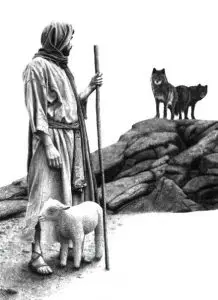 God the Father has placed the sheep in Jesus’ care. They are not inherently his, but their care was given or delegated to him. Jesus said that no one will be able to snatch them from his hands or the Father’s because the Father is greater than all. Notice that Jesus did not say “we” are greater than all, or that the Trinity is greater than all, but that the Father is singularly greater. Jesus repeats this truth a few chapters later when he says, “I go to the Father, for the Father is greater than I.”[4] This is an important point to acknowledge. Jesus is subordinate to God as evidenced by this statement, as well as in the fact that God delegated authority to His Christ. God the Father is the greater of the two.
God the Father has placed the sheep in Jesus’ care. They are not inherently his, but their care was given or delegated to him. Jesus said that no one will be able to snatch them from his hands or the Father’s because the Father is greater than all. Notice that Jesus did not say “we” are greater than all, or that the Trinity is greater than all, but that the Father is singularly greater. Jesus repeats this truth a few chapters later when he says, “I go to the Father, for the Father is greater than I.”[4] This is an important point to acknowledge. Jesus is subordinate to God as evidenced by this statement, as well as in the fact that God delegated authority to His Christ. God the Father is the greater of the two.
Some might claim that when Jesus said, “I give eternal life” to the sheep in verse 27, it proves he is God because only deity can grant eternal life. Indeed, only God can give eternal life. However, He can delegate that authority to His agent who acts on His behalf. This is exactly what we see in Jesus’ high priestly prayer:
John 17:1-2 (NASB) Jesus spoke these things; and lifting up His eyes to heaven, He said, “Father, the hour has come; glorify Your Son, that the Son may glorify You, 2 even as You gave Him authority over all flesh, that to all whom You have given Him, He may give eternal life. (emphasis added)
God the Father gave Jesus authority over all flesh that he might extend eternal life to those whom God had given him. This truth is seen several other times in Scripture as well.[5] Jesus’ ability to grant eternal life is not an innate ability, rather it was one given to him by God. Thus, Jesus and God the Father are united in their care for the sheep. There is a unity of purpose between God and His good shepherd.
John 10:30-33 (NASB) “I and the Father are one.” 31 The Jews picked up stones again to stone Him. 32 Jesus answered them, “I showed you many good works from the Father; for which of them are you stoning Me?” 33 The Jews answered Him, “For a good work we do not stone You, but for blasphemy; and because You, being a man, make Yourself out to be God.” (emphasis added)
This is where most people stop reading, claiming that Jesus’ statement of “oneness” or unity is proof that they share the same God-essence, despite the fact the that word “essence” or “substance” is absent from the text. They offer the Jews’ charge of blasphemy as evidence that proves their position. But in order to better understand the meaning of both Jesus’ statement and that of his opposition, we must continue to examine the passage.
What does it mean to be “one?”
What does it mean that Jesus and the Father are one? Is it one in purpose as I have suggested or one in essence as Trinitarians claim? The Greek language here gives us insight into Jesus’ meaning. The word “one” in the Greek is either “hen” or “heis” depending on the context. Hen (or en) is used to describe one thing, while heis is used to mean one person. For example, Mark 12:29 says, “…Hear, O Israel, the Lord our God is One Lord…” The “one” here in the Greek is heis because “one” refers to a person, not a thing. If in John 10:30 Jesus was trying to communicate that he and the Father were both God, he would have said, “I and the Father are one (heis)” because “persons” are what is united. However, Jesus said, “I and the Father are one (hen), because they are united in their purpose or function which is a “thing.” As stated, the purpose or mission that unites them is their care for the sheep.[6] Trinitarian scholars actually agree that the unity or “oneness” that God and His shepherd share is that of purpose; the care of the sheep. Baptist theologian, George R. Beasley-Murray, writes:
The setting of v 30 in relation to v 28 shows that a functional unity of the Son and the Father in their care for the sheep is in mind. From earliest times it has been observed that Jesus says, ‘I and the Father are one’ (Greek: ‘en’), not ‘heis’, i.e., one in action, not in person.[7] (emphasis added)
Biblical scholar and Trinitarian, David Brown, well known for his part in the Jamieson-Fausset-Brown Bible Commentary, says the “oneness of essence is not the precise thing here affirmed…”[9]
F. F. Bruce points out the unity of purpose that exists between the Father and the Son in his comments regarding a similar passage to the one under review:
“Here we have a particular application of the statements in John 5:19-23. So responsive is the Son to the Father that he is one in mind, one in purpose, one in action with him.” (The Gospel and Epistles of John, p. 232-233).*
In addition, John Calvin, Protestant Reformer and also a Trinitarian, writes in his commentary:
[Jesus] therefore testifies that his affairs are so closely united to those of the Father, that the Father’s assistance will never be withheld from himself and his sheep. The ancients made a wrong use of this passage to prove that Christ is of the same essence with the Father. For Christ does not argue about the unity of substance, but about the agreement which he has with the Father, so that whatever is done by Christ will be confirmed by the power of his Father.”[10]
Church Historian, Kegan Chandler, agrees that the “ancients” wrongly used this passage in an attempt to prove Jesus was God. More specifically, Athanasius and his followers leveraged their interpretation of John 10:30 at the Council of Nicaea.[11] At the end of the day, their beliefs prevailed under the oversight of Emperor Constantine. Trinitarian professor and author, R.V.G. Tasker, agrees with this assessment:
One translates the Greek neuter hen. This verse was much quoted in the Arian controversy [Council of Nicaea] by the orthodox in support of the doctrine that Christ was of one substance with the Father. The expression seems however mainly to imply that the Father and the Son are united in will and purpose. Jesus prays in [John 17:11] that His followers may all be one (hen) [or en] , i.e. united in purpose, as He and His Father are united.”[12]
The context of John chapter 10 is important in understanding the meaning of Jesus statement that the “Father and I are one,” but so is the larger context of John’s gospel. What else does John record about Jesus and God being one?
John 17:11 and 22-23 (NASB) “I am no longer in the world; and yet they themselves are in the world, and I come to You. Holy Father, keep them in Your name, the name which You have given Me, that they may be one even as We are…22 “The glory which You have given Me I have given to them, that they may be one, just as We are one; 23 I in them and You in Me, that they may be perfected in unity, so that the world may know that You sent Me, and loved them, even as You have loved Me. (emphasis added)
In whatever way God and Jesus are one must, by reason of John 17, be applicable to Jesus’ followers since we are one “just as” or in the same way he and the Father are one. If Jesus and God are one in essence, then Jesus is praying that believers would likewise become the same essence. This, of course, is absurd. What Jesus has in mind here and in John 10, is a unity of purpose.
Some may question why, if Jesus meant that he and the Father were one in purpose, did the Jews accuse him of making himself out to be God?
John 10:31-33 (NASB) The Jews picked up stones again to stone Him. 32 Jesus answered them, “I showed you many good works from the Father; for which of them are you stoning Me?” 33 The Jews answered Him, “For a good work we do not stone You, but for blasphemy; and because You, being a man, make Yourself out to be God.” (emphasis added)
Jesus’ defense
For the next several verses, Jesus mounts a Scriptural defense of his claim:
John 10:34-38 (NASB) Jesus answered them, “Has it not been written in your Law, ‘I SAID, YOU ARE GODS’? 35 “If he called them gods, to whom the word of God came (and the Scripture cannot be broken), 36 do you say of Him, whom the Father sanctified and sent into the world, ‘You are blaspheming,’ because I said, ‘I am the Son of God’? 37 “If I do not do the works of My Father, do not believe Me; 38 but if I do them, though you do not believe Me, believe the works, so that you may know and understand that the Father is in Me, and I in the Father.” (emphasis added)
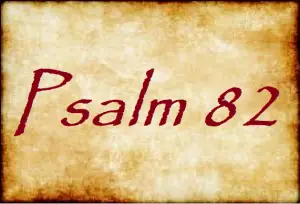 Jesus quoted Psalm 82:1 & 6:
Jesus quoted Psalm 82:1 & 6:
Psalm 82:1-2 (NASB) God takes His stand in His own congregation; He judges in the midst of the rulers. 2 How long will you judge unjustly and show partiality to the wicked? Selah. (emphasis added)
Here the psalmist records God’s rebuke of those whom He had appointed to rule in His stead. The word rulers in Hebrew is elohim and it means god(s). It can be used to refer to men, angels, god(s) and even the Most High God. For example:
Exodus 7:1 (NASB) Then the LORD said to Moses, “See, I make you as God (elohim) to Pharaoh, and your brother Aaron shall be your prophet. (emphasis added)
God literally told Moses that He would make him “God”[13] to Pharaoh. (Note that the word “as” is in italics signifying it is not in the original but was added by the translators. Thus, God literally said, “See I make you God to pharaoh…”) We have been taught to think that the word God/god is reserved for deity, whether it’s used of the one true God or of a false god. However, “god” can be a Biblical designation for God’s agents; those who represent Him as is the case of Moses. Likewise, in Psalm 82 the judges or rulers of Israel mentioned in verse 1 are called “gods” by God in verse 6.
Psalm 82:6-7 (NASB) I said, “You are gods (elohim), and all of you are sons of the Most High. 7 “Nevertheless you will die like men and fall like any one of the princes.” (emphasis added)
The word “ruler” in verse 1 and “gods” in verse 6 are both elohim, and both can be translated as “gods.” It doesn’t mean they are deity, but that they have been appointed by God to judge or rule on His behalf. This is exactly how the Amplified Bible translates the passage:
Psalm 82:6 (Amplified Bible) I said, You are gods [since you judge on My behalf, as My representatives]; indeed, all of you are children of the Most High.
Jesus quotes this passage to point out that if God appropriately called the judges or rulers “gods” and sons of the Most High because they were given delegated authority as His representatives, why were the Jews upset if he called himself the Son of God and had the miracles to substantiate his claim? Their response? Because Jesus wrongly made himself out to be god. They did not or would not acknowledge that God had appointed Jesus as his agent, therefore, he must have appointed himself. Thus, his “false” claim was worthy of stoning.
John 10:33 (NASB) The Jews answered Him, “For a good work we do not stone You, but for blasphemy; and because You, being a man, make Yourself out to be God. (emphasis added)
Note that “God” could also be written using a lower case “g”. In the original Greek, there is no distinction between lower and upper case words. The Trinitarian translators chose to impose their bias on the text and capitalize the “G” so as to make it look like they were accusing Jesus of claiming to be Yahweh. But the context and the grammar do not call for the word to be capitalized.
In the closing remarks of this passage we see that in spite of the Jews’ accusation of blasphemy, many came to believe in Jesus.
John 10:39-42 (NASB) Therefore they were seeking again to seize Him, and He eluded their grasp. 40 And He went away again beyond the Jordan to the place where John was first baptizing, and He was staying there. 41 Many came to Him and were saying, “While John performed no sign, yet everything John said about this man was true.” 42 Many believed in Him there. (emphasis added)
What did they believe about Jesus? Did they believe he was God? The text clarifies for us that they believed what John Baptist had said about “this man” What did John the Baptist say? He said that Jesus was “the Lamb of God,” not God the Lamb. In addition, he said that Jesus was the Son of God, which was a messianic title, and not God the Son. And specifically in keeping with the text of John 10, John the Baptist declared Jesus to be the Christ.[14] This is who the people believed Jesus to be: the Christ sent by God.
In conclusion, contrary to popular Trinitarian belief, the context and the Greek language reveal that Jesus is not claiming to be God[15] when he says “the Father and I are one.” Rather he is saying that he is God’s representative, just as the rulers (judges) were gods to the Israelites. Jesus said that he and the Father, who is greater than all, are united in the purpose of caring for the sheep. The miracles God performed through Jesus served to attest that he was the Christ, sent by God and given the authority to do His will.
*Note: In an earlier version of this article, a quote was incorrectly attributed to F.F. Bruce, The Gospel and Epistles of John, p. 232-233. While the reference was correct, the quote was not. The quote that now appears above is the correct quote. My sincere apologies for this error.
[1] See John 10:19-21
[2] A similar line of questioning occurred in John 8:25
[3] See John 4:25-26, 39-42, etc. Or other synonymous titles such as Son of God, Son of Man, Messiah, etc.
[4] See John 14:28
[5] See also John 5:21-22, 25-28; 6:39-40; 1 John 5:11, etc.
[6] See John 10:25, 28-29
[7] George R. Beasley-Murray, World Biblical Commentary, (New York: Thomas Nelson, 1999), Vol. 36, p. 174.
[8] F.F. Bruce, The Gospel and Epistles of John, p. 232-233.
[9] David Brown, “John,” The Classic Bible Commentary,” Owen Collins, ed., (Wheaton, IL: Crossway Books, 1999), p. 1115.
[10] John Calvin, “Commentary on the Gospel of John,” Christian Classics Ethreal Library, accessed 05-24-19, http://www.ccel.org/ccel/calvin/calcom34.xvi.v.html
[11] Kegan A. Chandler, The God of Jesus in Light of Christian Dogma, (McDonough, GA: Restoration Fellowship, 2016), p. 182-183.
[12] R.V.G. Tasker, “The Gospel According to St John,” Tyndale New Testament Commentaries, (1960), p.136.
[13] See also Exodus 4:16
[14] See John 1:20, 25-34; 3:25-30
[15] In John 10:38 Jesus says, “Father is in Me and I am in the Father”– this is not a statement of deity. We are said to be “in Christ” and “he is in us,” yet we are not Christ or deity (John 15:1-7;17:23)

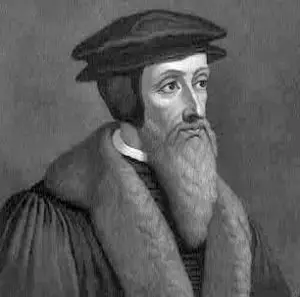
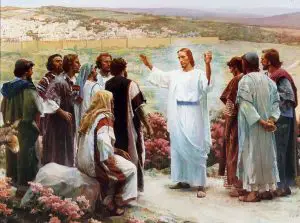
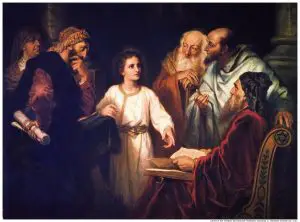
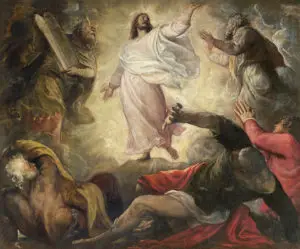
Absolutely fantastic, also, the Bible clearly says he who plants and he who waters are one, and if you go through ALL of the translations, they shift between one and one purpose
Yes, 1 Corinthians 3:7-8! Well said. Thanks for adding your thoughts.
Blessings!
strong’s concordane says all the places you say the word one is greek hen is actually the greek eis the numeral one.
Greetings Benny!
Here is a link to John 10:30 in Strong’s. As you can see, Strong’s says “one” here is Greek ἓν or “hen.” This link shows where ἓν or “hen” is used in passages, John 10:30 is one of them. Here, in this link, is the Greek εἷς “heis”. Note that John 10:30 is not listed as a passage where εἷς or “heis” occurs.
Blessings,
OGW